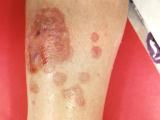Aug 30, 2010
E coli illness cluster prompts ground beef recall
A Pennsylvania ground beef producer, Cargill Meat Solutions Corp., on Aug 28 recalled 8,500 pounds of ground beef after Maine and New York officials linked the meat to an Escherichia coli O26 illness cluster, according to a recall notice from the US Department of Agriculture (USDA). So far officials have identified two case-patients from Maine and one from New York. Illness onsets ranged from Jun 24 through Jul 16. The meat, contained in 14-pound chubs, was produced on Jun 11 and shipped to distribution centers in Connecticut and Maryland for further distribution and were repackaged into consumer-sized packages and sold under a variety of retail brand names. The products bear the establishment number "EST 9400" inside the USDA inspection mark. E coli O126 is one of six non-O157 Shiga toxin–producing E coli (STEC) strains that the US Centers for Disease Control and Prevention regards as adulterants in primal beef cuts. USDA officials are considering if they should regulate the non-O157 STEC strains in beef products.
Aug 28 USDA recall notice
AAP issues updated flu guidance
The American Academy of Pediatrics (AAP) today updated its guidelines for preventing and treating influenza in children, including recommendations on vaccines and antivirals. The guidelines, which appeared online today in Pediatrics, mirror the Centers for Disease Control and Prevention's stance that all children 6 months or older should receive the seasonal flu vaccine, which contains the 2009 H1N1 strain. It also includes a decision tree on which children require two doses (those younger than 9 years old who are inadequately vaccinated), and which require one. The AAP also reinforces that the only antiviral drugs routinely recommended for flu treatment or prophylaxis in children are oseltamivir and zanamivir, to which the flu strains most likely to circulate in the Northern Hemisphere this fall and winter (2009 H1N1, seasonal H3N2, and influenza B) are predominantly susceptible.
Aug 30 Pediatrics abstract
Study: Tamiflu-resistant 2009 H1N1 passes fitness tests
Trials to assess the pathogenicity and transmissibility of oseltamivir-resistant 2009 H1N1 viruses in mice and ferrets suggest that the resistant strain is as fit as counterparts that are sensitive to the drug, according to Japanese researchers. The group, which includes Dr Yoshihiro Kawaoka, a virologist from the University of Wisconsin at Madison, reported their findings in PLoS Pathogens. In testing the susceptibility of the resistant viruses to antiviral drugs, they also explored the effect of two new antivirals, CS-8958, a long-acting neuraminidase inhibitor, and the viral RNA polymerase inhibitor favipiravir. The group found that the new drugs reduced viral replication and could be promising candidates to help fight 2009 H1N1 viruses. They also concluded that their findings support concerns about overuse of antiviral drugs.
Aug 26 PLoS Pathogens abstract
Report: US Defense Department eyes cuts to help fund HHS vaccine initiative
The US Department of Defense (DoD) plans to divert about $1 billion from its "weapons of mass destruction" programs to help pay for new efforts by the Department of Health and Human Services (HHS) to boost the development and production of vaccines, according to an Aug 27 report by Global Security Newswire (GSN). A Pentagon budget document obtained by GSN said the move will reduce DoD spending on chemical, biological, radiological, and nuclear (CBRN) defense programs by $1.07 billion between fiscal years 2012 and 2016. The document described the step as part of the DoD response to the White House's new vaccine initiative. As noted in the story, HHS issued a report Aug 19 outlining plans to overhaul the nation's biodefense, or medical countermeasures, program, which includes plans for building several centers for the advanced development of vaccines and other countermeasures and for quickly boosting vaccine production capacity. The GSN story said the DoD move will cut funds for biological and chemical detection systems, gear to decontaminate skin after exposure, systems to coordinate military operations in response to an attack, and protective clothing. In addition to the $1.07 billion, another $442 million will be trimmed from DoD CBRN programs in efficiency measures required by Defense Secretary Robert Gates, the report said.
Aug 27 GSN report
Aug 19 CIDRAP News story on HHS biodefense plans
US appeals court affirms ruling that vaccines don't cause autism
The US Court of Appeals in Washington, DC, affirmed on Aug 27 an earlier ruling that there is little or no evidence that vaccines cause autism, according to an Aug 28 Associated Press (AP) report. Although numerous studies have found no link between vaccines and autism, more than 5,500 families have sought compensation for autism through the federal Vaccine Injury Compensation Program. The latest ruling came in the case of Michelle Cedillo of Yuma, Ariz., who has autism, inflammatory-bowel disease, and other disorders that her parents blame on a measles vaccine she received at the age of 15 months, the AP reported. In rejecting the parents' petition last year, Special Master Denise Vowell of the US Court of Federal Claims wrote that the evidence purported to link autism with vaccines is "weak, contradictory and unpersuasive," the story said. In the latest ruling, the appeals court wrote, "We have carefully reviewed the decision of the special master, and we find that it is rationally supported by the evidence, well-articulated and reasonable." The Elizabeth Birt Center for Autism Law and Advocacy criticized the ruling, saying it involved "government lawyers . . . presenting government-funded science to government judges, with no jury and no normal rules of evidence." The AP story noted that the Court of Federal Claims also concluded earlier this year that thimerosal, used as a preservative in some vaccines, does not cause autism.
Aug 28 AP story on court ruling
Aug 30 statement by Elizabeth Birt Center
Feb 12, 2009, CIDRAP news story on 2009 ruling






















